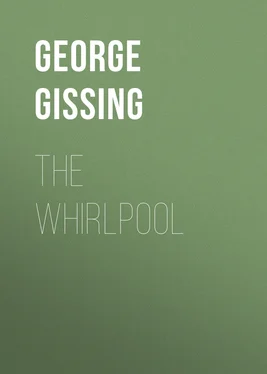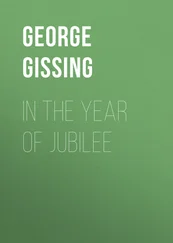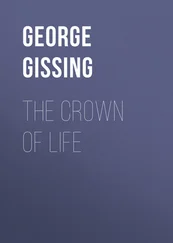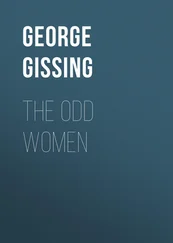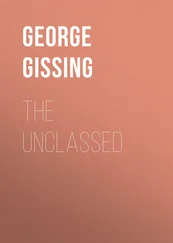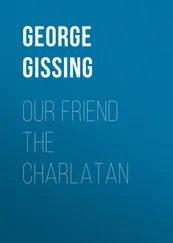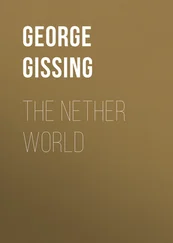George Gissing - The Whirlpool
Здесь есть возможность читать онлайн «George Gissing - The Whirlpool» — ознакомительный отрывок электронной книги совершенно бесплатно, а после прочтения отрывка купить полную версию. В некоторых случаях можно слушать аудио, скачать через торрент в формате fb2 и присутствует краткое содержание. Жанр: foreign_prose, literature_19, foreign_antique, на английском языке. Описание произведения, (предисловие) а так же отзывы посетителей доступны на портале библиотеки ЛибКат.
- Название:The Whirlpool
- Автор:
- Жанр:
- Год:неизвестен
- ISBN:нет данных
- Рейтинг книги:4 / 5. Голосов: 1
-
Избранное:Добавить в избранное
- Отзывы:
-
Ваша оценка:
- 80
- 1
- 2
- 3
- 4
- 5
The Whirlpool: краткое содержание, описание и аннотация
Предлагаем к чтению аннотацию, описание, краткое содержание или предисловие (зависит от того, что написал сам автор книги «The Whirlpool»). Если вы не нашли необходимую информацию о книге — напишите в комментариях, мы постараемся отыскать её.
The Whirlpool — читать онлайн ознакомительный отрывок
Ниже представлен текст книги, разбитый по страницам. Система сохранения места последней прочитанной страницы, позволяет с удобством читать онлайн бесплатно книгу «The Whirlpool», без необходимости каждый раз заново искать на чём Вы остановились. Поставьте закладку, и сможете в любой момент перейти на страницу, на которой закончили чтение.
Интервал:
Закладка:
Last winter Harvey had chanced to meet Alma and her stepmother at Leipzig, at a Gewandhaus concert. He was invited to go with them to hear the boys' motet at the Thomaskirche; and with this intercourse began the change in their relations from mere acquaintance to something like friendship. Through the following spring Rolfe was a familiar figure at the Frothinghams'; but this form of pleasure soon wearied him, and he was glad to escape from London in June. He knew the shadowy and intermittent temptation which beckoned him to that house; music had power over him, and he grew conscious of watching Alma Frothingham, her white little chin on the brown fiddle, with too exclusive an interest. When 'that fellow' Cyrus Redgrave, a millionaire, or something of the sort, began to attend these gatherings with a like assiduity, and to win more than his share of Miss Frothingham's conversation, Harvey felt a disquietude which happily took the form of disgust, and it was easy enough to pack his portmanteau.
Through the babble of many voices in many keys, talk mingling with laughter more or less melodiously subdued, he made his way up the great staircase. As he neared the landing, there sounded the shrill squeak of a violin and a 'cello's deep harmonic growl. His hostess, small, slender, fair, and not yet forty, a jewel-flash upon her throat and in the tiara above her smooth low forehead, took a step forward to greet him.
'Really? How delightful! I shot at a venture, and it was a hit after all!'
'They are just beginning?'
'The quartet—yes. Herr Wilenski has promised to play afterwards.'
He moved on, crossed a small drawing-room, entered the larger room sacred to music, and reached a seat in the nick of time. Miss Frothingham, the violin against her shoulder, was casting a final glance at the assembly, the glance which could convey a noble severity when it did not forthwith impose silence. A moment's perfect stillness, and the quartet began. There were two ladies, two men. Miss Frothingham played the first violin, Mr. AEneas Piper the second; the 'cello was in the hands of Herr Gassner, and the viola yielded its tones to Miss Dora Leach. Harvey knew them all, but had eyes only for one; in truth, only one rewarded observation. Miss Leach was a meagre blonde, whose form, face, and attitude enhanced by contrast the graces of the First Violin. Alma's countenance shone—possibly with the joy of the artist, perhaps only with gratified vanity. As she grew warm, the rosy blood mantled in her cheeks and flushed her neck. Every muscle and nerve tense as the strings from which she struck music, she presently swayed forward on the points of her feet, and seemed to gain in stature, to become a more commanding type. Her features suggested neither force of intellect or originality of character: but they had beauty, and something more. She stood a fascination, an allurement, to the masculine sense. Harvey Rolfe had never so responded to this quality in the girl; the smile died from his face as he regarded her. Of her skill as a musician, he could form no judgment; but it seemed to him that she played very well, and he had heard her praised by people who understood the matter; for instance, Herr Wilenski, the virtuoso, from whom—in itself a great compliment—Alma was having lessons.
He averted his eyes, and began to seek for known faces among the audience. His host he could not discover; Mr. Frothingham must be away from home this evening; it was seldom he failed to attend Alma's concerts. But near the front sat Mrs. Ascott Larkfield, a dazzling figure, and, at some distance, her daughter Mrs. Carnaby, no shadow of gloom upon her handsome features. Hugh was not in sight; probably he felt in no mood for parties. Next to Mrs. Carnaby sat 'that fellow', Cyrus Redgrave, smiling as always, and surveying the people near him from under drooping brows, his head slightly bent. Mr. Redgrave had thin hair, but a robust moustache and a short peaked beard; his complexion was a rifle sallow; he lolled upon the chair, so that, at moments, his head all but brushed Mrs. Carnaby's shoulder.
Long before the close of the piece, Rolfe had ceased to listen, his thoughts drifting hither and hither on a turbid flood of emotion. During the last passage— Allegro molto leggieramente —he felt a movement round about him as a general relief, and when, on the last note, there broke forth (familiar ambiguity) sounds of pleasure and of applause, he at once stood up. But he had no intention of pressing into the throng that rapidly surrounded the musicians. Seeing that Mr. Redgrave had vacated his place, whilst Mrs. Carnaby remained seated, he stepped forward to speak with his friend's wife. She smiled up at him, and lifted a gloved finger.
'No! Please don't!'
'Not sit down by you?'
'Oh, certainly. But I saw condolence in your face, and I'm tired of it. Besides, it would be mere hypocrisy in you.'
Harvey gave a silent laugh. He had tried to understand Sibyl Carnaby, and at different times had come to very different conclusions regarding her. All women puzzled, and often disconcerted, him; with Sibyl he could never talk freely, knowing not whether to dislike or to admire her. He was not made on the pattern of Cyrus Redgrave, who probably viewed womankind with instinctive contempt, yet pleased all with the flattery of his homage.
'Well, then, we won't talk of it,' he said, noticing, in the same moment, that her person did not lack the adornment of jewels. Perhaps she had happened to be wearing these things on the evening of the robbery; but Rolfe felt a conviction that, under any circumstances, Sibyl would not be without rings and bracelets.
'They certainly improve,' she remarked, indicating the quartet with the tip of her fan.
Her opinions were uttered with calm assurance, whatever the subject. An infinite self-esteem, so placid that it never suggested the vulgarity of conceit, shone in her large eyes and dwelt upon the beautiful curve of her lips. No face could be of purer outline, of less sensual suggestiveness; it wore at times an air of cold abstraction which was all but austerity. Rolfe imagined her the most selfish of women, thought her incapable of sentiment; yet how was her marriage to be accounted for, save by supposing that she fell in love with Hugh Carnaby? Such a woman might surely have sold herself to great advantage; and yet—odd incongruity—she did not impress one as socially ambitious. Her mother, the ever-youthful widow, sped from assembly to assembly, unable to live save in the whirl of fashion; not so Sibyl. Was she too proud, too self-centred? And what ambition did she nourish?
Or was it all an illusion of the senses? Suppose her a mere graven image, hollow, void. Call her merely a handsome woman, with the face of some remarkable ancestress, with just enough of warmth to be subdued by the vigorous passion of such a fine fellow as Carnaby. On the whole, Rolfe preferred this hypothesis. He had never heard her say anything really bright, or witty, or significant. But Hugh spoke of her fine qualities of head and heart; Alma Frothingham made her an exemplar, and would not one woman see through the vacuous pretentiousness of another?
Involuntarily, he was gazing at her, trying to read her face.
'So you think we ought to go to Australia,' said Sibyl quietly, returning his look.
Hugh had repeated the conversation of last night; indiscreet, but natural. One could not suppose that Hugh kept many secrets from his wife.
'I?' He was confused. 'Oh, we were talking about the miseries of housekeeping–'
'I hate the name of those new countries.'
It was said smilingly, but with what expression in the word 'hate'!
'Vigorous cuttings from the old tree,' said Rolfe. 'There is England's future.'
'Perhaps so. At present they are barbarous, and I have a decided preference for civilisation. So have you, I am quite sure.'
Читать дальшеИнтервал:
Закладка:
Похожие книги на «The Whirlpool»
Представляем Вашему вниманию похожие книги на «The Whirlpool» списком для выбора. Мы отобрали схожую по названию и смыслу литературу в надежде предоставить читателям больше вариантов отыскать новые, интересные, ещё непрочитанные произведения.
Обсуждение, отзывы о книге «The Whirlpool» и просто собственные мнения читателей. Оставьте ваши комментарии, напишите, что Вы думаете о произведении, его смысле или главных героях. Укажите что конкретно понравилось, а что нет, и почему Вы так считаете.
